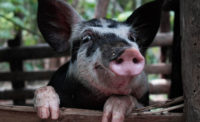USDA Grants $2.4 Million to UNL for Swine-Focused Research to Improve Food Safety, Animal Health

Image credit: Amber Kipp via Unsplash
The U.S. Department of Agriculture’s National Institute of Food and Agriculture (USDA’s NIFA) has awarded $2.48 million in grants to the University of Nebraska-Lincoln (UNL) for research that aims to improve food safety and animal health in swine production.
The funds will be dispersed across four projects. The first study, which is a collaboration with the United States Meat Animal Research Center (USMARC) and the USDA Agricultural Research Center (ARS) National Animal Disease Center, will examine the ecology of antibiotic resistance gene pools within the swine production system and its effect on the emergence and spread of antimicrobial resistance (AMR) to inform the development of management and nutritional strategies that reduce antimicrobial use.
The second project aims to detect relationships between host genetics, microbial pathogens, animal growth, and health, with the goal of developing genetic tests and management solutions to improve animal health and welfare by predicting the genetic susceptibility of pigs to specific microbial diseases. The third and fourth projects are also related to disease prevention for swine, with one focused on identifying what cellular factors are required to produce a Porcine Reproductive and Respiratory Syndrome Virus infection, and the other looking into host genetic variants that promote infection of Avian Influenza Virus (AIV) in swine. Solutions to increase AIV disease resiliency could protect human health by decreasing the ability of AIV to adapt to mammalian hosts, which would reduce the emergence of novel pathogenic strains that could infect people.
Looking for a reprint of this article?
From high-res PDFs to custom plaques, order your copy today!





